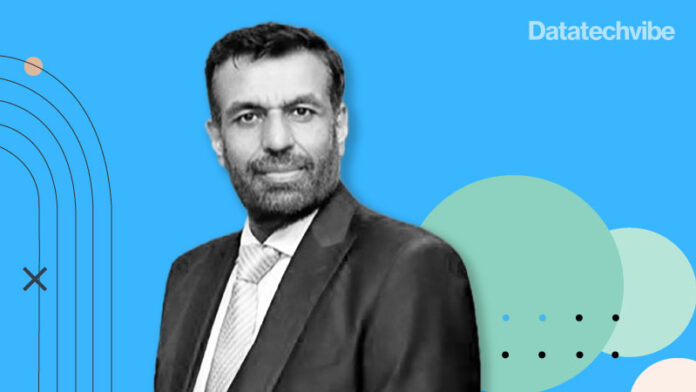According to a report, the edge computing market size is expected to grow from $36.5 billion in 2021 to $87.3 billion by 2026 at a CAGR of 19 per cent.
The growing adoption of IoT across industries, exponentially increasing data volumes and network traffic and rising demand for low-latency processing and real-time, automated decision-making solutions are driving the growth of edge computing.
Vickram Nagi, MD of Kyndryl, META, talks about the benefits of edge computing, how organisations are getting cloud smart in the region, and data management solutions.
Excerpts from the interview:
Is edge computing gaining traction in the Middle East? Do you see edge being dominant?
Digital transformation is a key objective of government plans in the Middle East region. However, true digital transformation can only be achieved when next-generation technologies come together, such as Edge, Cloud, AI and 5G.
We are already seeing several investments in the region in such areas as a part of national initiatives, such as the UAE’s National Artificial Intelligence Strategy 2031, Saudi Arabia’s Vision 2030 and Digital Egypt. Such investments are only going to increase in the years to come.
According to IDC, enterprise spending on digital transformation in the Middle East, Turkey, and Africa is expected to increase in the post-pandemic period, increasing from 26 per cent of total IT spending in 2020 to 38 per cent in 2024.
So, when it comes to edge computing in particular, the technology is gaining more traction in the Middle East by organisations looking to reduce network latency and optimise costs and governments to build and transform smart cities.
Organisations are getting cloud smart in the region. Do you see a more hybrid cloud or multi-cloud architecture?
The Covid-19 has tested organisations and governments of all industries, geographies, and sizes and forced them to transform the way they operate and do business quickly. With such disruption, we saw an accelerated shift to the cloud, and that flexibility has quickly become of critical importance.
However, moving to the cloud is a strategic decision determined based on various factors that are specific and unique to an organisation’s requirements. There is no “one-cloud-fits-all” strategy.
So, as we see more organisations in the Middle East place flexibility as a top priority, both hybrid cloud and multi-cloud are increasingly becoming the go-to models.
Having the right service provider is critical to designing and achieving a successful cloud strategy and co-create the right cloud solutions based on best of breed platforms to drive digital transformation.
Are you looking to pivot to a broader set of fast-growing transformational services and build partnerships in the region?
Kyndryl is a spin-off of IBM’s Managed Infrastructure Services business. Last year, we completed the separation from IBM and celebrated becoming an independent, publicly-traded company listed on the New York Stock Exchange.
The separation of Kyndryl and IBM is centred on the concept of creating value through focus. By creating two distinct and powerful market-leading companies, each will be able to focus on the core competencies our customers most need.
A key advantage of Kyndryl being a stand-alone company is the freedom of action that comes with being a stand-alone entity. We are also continuously building the right skills and forging strategic partnerships with vendors and hyperscalers, including AWS, Google, Microsoft, VMWare, Pure Storage, SAP, Nokia and G42 Cloud.
What’s the most exciting challenge in data management? What are the possible solutions?
Data management is a vast and complex area of business operations. It’s also a multidisciplinary process that goes beyond a single skill set.
With the exponential growth of data of various formats and sources, a well-executed data management strategy is key for businesses to unlock opportunities and improve customer-facing and internal operations.
Data management is not an easy task as it requires a comprehensive understanding of an organisation’s data. Accordingly, massive volumes of structured and unstructured data of various formats and sources can be collected, analysed and stored to achieve business goals.
So to your question, the most exciting challenge in data management is successfully tapping into a virtual goldmine of unused data and seeing it translate into decisions and valuable insights that can transform operations and provide a competitive advantage.
Tell us about the Cyber Resiliency Solution you recently launched with VMware?
The COVID-19 pandemic and the shift to working from home sparked a new rash of headlines about the rising threat of cyberattacks, as new technologies were put in place to support our new operating reality. For every headline-grabbing security breach, thousands of unreported attacks occur each day. Most of these attacks target the most vulnerable businesses – and their supply chains – through which bad actors seek to gain access to data from interconnected systems.
Cyber threats are unavoidable, and we must treat living with them as one does living with viruses. Cyber resiliency services are an essential component of modernising and managing any IT infrastructure, and strategies and budgets must be aligned to address our “new normal.” Companies must prioritise fast-track modernisation programs – to infrastructure like a hybrid cloud – to achieve a resilient business transformation.
It is one of the drivers behind expanding our partnership with VMware, which allows us to combine Kyndryl’s enterprise-grade cyber resiliency expertise with VMware’s application security expertise and apply them in ways that better protect customers’ data and modernise their IT to transform their businesses.
Kyndryl and VMware have worked together for many years, helping customers reduce risks and costs with new solutions across the VMware software-defined Stack for Cyber Resiliency: all backed by Kyndryl’s managed cyber resiliency services.
Partnerships like this are an excellent way to stay ahead of the skills needed to continue to combat cyberattacks.
If you liked reading this, you might like our other stories
March Round-Up: All The Tech News You Need To Know
How AI And Analytics Can Improve Cybersecurity









